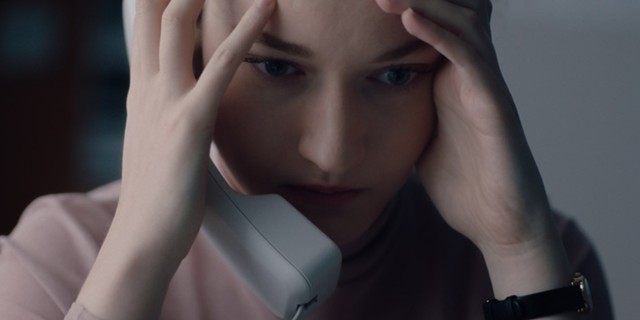[
{
"name": "500x250 Ad",
"insertPoint": "5",
"component": "15667920",
"parentWrapperClass": "",
"requiredCountToDisplay": "1"
}
]
It’s impossible not to think of Harvey Weinstein while watching “The Assistant.” Though the disgraced movie mogul never appears on screen, nor is he mentioned by name, his presence haunts Kitty Green’s piercing look at systemic abuses of power in the workplace.
Julia Garner stars as Jane, a junior assistant for a powerful executive at an international, New York City-based film production company. She’s been in the position only a matter of months, residing squarely at the bottom of the office hierarchy.
She’s expected to be the first one in and the last one out each day, and we follow her through one of those days, observing the quotidian tasks that fill the hours as she quietly moves through the office. She tidies her boss’s workspace, orders lunch, arranges travel details, coordinates his schedule with the driver, gives his couch a quick scrub (“never sit on the couch,” one executives jokes to another as they gather for a meeting), and fields calls from his exasperated wife (Stéphanye Dussud). The male assistants project an arrogant air of seniority, stopping to help Jane draft apology emails to their boss after he reprimands her harshly for any missteps.
Troubling details don’t escape Jane’s notice, though her job requires her to look the other way.
A revolving door of beautiful women cycle through the office; new discoveries hoping for their big break. There’s the young woman who comes by to retrieve an earring found on his office floor. A pretty young girl (Kristine Froseth) shows up claiming to be a new hire, and Jane rides with her to the hotel where their boss has scheduled a meeting with her.
It’s all in service of a man we never see and only occasionally hear, through the wall or over the phone. Green doesn’t give him any screen time, though his presence completely fills up the space. But by leaving him entirely off camera, Green’s film becomes less about this single individual, than the entire system that lets him operate.
What’s really happening underneath it all is never expressed directly through dialogue, only registering in the worry that increasingly spreads across Garner’s face. She gives a remarkably controlled performance, giving the appearance of a young woman working very hard to suppress a scream. Director of photography Michael Latham shoots the drab office setting with chilly, green-tinted cinematography and harsh lighting, adding to the subtle tension and general sense of unease.
Jane is low on the totem pole, and feels helpless to do anything. People don’t need to tell her how lucky she is to be there (though they often do). It’s a dream job, or at least on the path toward that dream job, and she’d be a fool to throw it away. She’s smart, they tell her, and if she plays her cards right, she’ll go far.
At one point Jane does approach a human resources manager (Matthew Macfadyen), though even then she’s afraid to come out and say exactly what’s concerning her. His response only makes her second guess her decision to say anything at all. There are hundreds of people who depend on their job with the company, he reminds her. What would happen to them if someone raised the alarm and it suddenly all went away?
Already an award-winning documentary filmmaker, Kitty Green transitions to a fictional narrative for the first time. As a filmmaker, Green seems to have an interest in human behavior, particularly how we respond when confronted with the darkest aspects of human nature.
Her previous film was the audacious “Casting JonBenet,” which examined the infamous murder of child beauty queen JonBenét Ramsey through interviews with actors from Colorado auditioning for a movie version of the story. Hearing these actors engage in speculation and their own theories about the case revealed how our fascination with these horrific true-crime stories comes largely from the way we project our own experiences onto them.
The release of “The Assistant” coincides with Weinstein’s criminal trial, and in many ways it feels like a response to those who read the stories about years of alleged abuse and wondered, “How could no one have said something?”
We see the answer to that question, watching an office full of people willfully keep their heads down, their fear and resigned silence allowing a predator to stay protected. And it’s chilling to note how easily this story could be transposed to any other workplace in any other industry. Beneath its cooly observational exterior, “The Assistant” practically hums with an anger drawn from what could be the story of countless women, all across the country.
As quiet and unassuming as its protagonist, “The Assistant” deliberately lacks any sort of conventionally satisfying narrative. Green’s film observes the ways we become numb to the insidious machinations of this system that allows predators to operate freely. And the daily, hourly, and lifelong compromises that allow those immovable structures to continue, waiting for someone, anyone to speak up and tear it all down.
Adam Lubitow is a freelance writer for CITY. Feedback on this article can be directed to [email protected].
Julia Garner stars as Jane, a junior assistant for a powerful executive at an international, New York City-based film production company. She’s been in the position only a matter of months, residing squarely at the bottom of the office hierarchy.
She’s expected to be the first one in and the last one out each day, and we follow her through one of those days, observing the quotidian tasks that fill the hours as she quietly moves through the office. She tidies her boss’s workspace, orders lunch, arranges travel details, coordinates his schedule with the driver, gives his couch a quick scrub (“never sit on the couch,” one executives jokes to another as they gather for a meeting), and fields calls from his exasperated wife (Stéphanye Dussud). The male assistants project an arrogant air of seniority, stopping to help Jane draft apology emails to their boss after he reprimands her harshly for any missteps.
Troubling details don’t escape Jane’s notice, though her job requires her to look the other way.
A revolving door of beautiful women cycle through the office; new discoveries hoping for their big break. There’s the young woman who comes by to retrieve an earring found on his office floor. A pretty young girl (Kristine Froseth) shows up claiming to be a new hire, and Jane rides with her to the hotel where their boss has scheduled a meeting with her.
It’s all in service of a man we never see and only occasionally hear, through the wall or over the phone. Green doesn’t give him any screen time, though his presence completely fills up the space. But by leaving him entirely off camera, Green’s film becomes less about this single individual, than the entire system that lets him operate.
What’s really happening underneath it all is never expressed directly through dialogue, only registering in the worry that increasingly spreads across Garner’s face. She gives a remarkably controlled performance, giving the appearance of a young woman working very hard to suppress a scream. Director of photography Michael Latham shoots the drab office setting with chilly, green-tinted cinematography and harsh lighting, adding to the subtle tension and general sense of unease.
Jane is low on the totem pole, and feels helpless to do anything. People don’t need to tell her how lucky she is to be there (though they often do). It’s a dream job, or at least on the path toward that dream job, and she’d be a fool to throw it away. She’s smart, they tell her, and if she plays her cards right, she’ll go far.
At one point Jane does approach a human resources manager (Matthew Macfadyen), though even then she’s afraid to come out and say exactly what’s concerning her. His response only makes her second guess her decision to say anything at all. There are hundreds of people who depend on their job with the company, he reminds her. What would happen to them if someone raised the alarm and it suddenly all went away?
Already an award-winning documentary filmmaker, Kitty Green transitions to a fictional narrative for the first time. As a filmmaker, Green seems to have an interest in human behavior, particularly how we respond when confronted with the darkest aspects of human nature.
Her previous film was the audacious “Casting JonBenet,” which examined the infamous murder of child beauty queen JonBenét Ramsey through interviews with actors from Colorado auditioning for a movie version of the story. Hearing these actors engage in speculation and their own theories about the case revealed how our fascination with these horrific true-crime stories comes largely from the way we project our own experiences onto them.
The release of “The Assistant” coincides with Weinstein’s criminal trial, and in many ways it feels like a response to those who read the stories about years of alleged abuse and wondered, “How could no one have said something?”
We see the answer to that question, watching an office full of people willfully keep their heads down, their fear and resigned silence allowing a predator to stay protected. And it’s chilling to note how easily this story could be transposed to any other workplace in any other industry. Beneath its cooly observational exterior, “The Assistant” practically hums with an anger drawn from what could be the story of countless women, all across the country.
As quiet and unassuming as its protagonist, “The Assistant” deliberately lacks any sort of conventionally satisfying narrative. Green’s film observes the ways we become numb to the insidious machinations of this system that allows predators to operate freely. And the daily, hourly, and lifelong compromises that allow those immovable structures to continue, waiting for someone, anyone to speak up and tear it all down.
Adam Lubitow is a freelance writer for CITY. Feedback on this article can be directed to [email protected].












